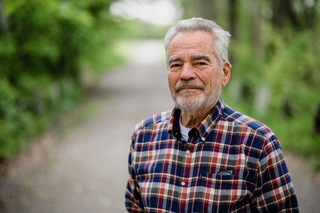Malcolm A. MacGregor, 81, a wildlife and environmental champion whose tireless advocacy left a long legacy of influence over the wildlife and ecosystem of Southeastern Massachusetts, passed away on May 31, 2024, with his family at his side.
Born in Weymouth to Robert Muir and Gladys Marie MacGregor, Malcolm’s life was dedicated to using his vast knowledge to understand and anticipate the local impacts of global climate change.
Malcolm was known for his wry humor and relentless concern for his natural surroundings. He believed that the protection of land, particularly forest land, was critical. He often pointed out that while forests help to control the carbon dioxide in the air everywhere, they are of particular significance in Plymouth, where vast tree cover protects invaluable, extensive groundwater resources.
Malcolm was the well-known champion and protector of Plymouth’s piping plover population at Long Beach, often cartoon-caricatured as such in the local papers. In his retirement he worked as a trail guide for the Wildlands Trust, where he had also served as a board member.
Malcolm had an extensive public service career. He only recently retired as the chair of the Plymouth Planning Board, where he served for 35 years. In total, he spent 50 years in Plymouth’s town government, including positions on the Conservation Commission and as chair of the Board of Health.
Malcolm established a noteworthy career in higher education. In his tenure at Massachusetts Maritime Academy, he began as a professor of math and physics, but later shifted his primary instructional focus to GIS mapping for the degree programs in Emergency Management and Marine Safety and Environmental Protection that he founded.
Born in 1943 and an academic by nature, Malcolm earned his BS in chemistry from Worcester Polytechnic Institute in 1966, and a Ph.D. in physical chemistry from the University of Connecticut in 1972. He conducted post-doctoral research at both the Naval Research Laboratory, in Washington D.C., and the University of Chicago.
If you were to ask Malcolm directly about how he came to work for any of the many causes and public offices he served – he’d have offered a humble response, like, “The environment needed it, and I could do it.”
Malcolm leaves behind his cherished wife, Arlene; sister Hollace Feingold MacGregor of Plymouth; three beloved sons, Robert and partner Dina Butts of Manomet, Scott and wife Erin of Duxbury, and Glenn and partner Lana of Plymouth; grandchildren Brendan and his mother Alicia, Eva, Oliver, Will, Isabel, Hamish, Mila and Luka; and nephews Andrew and Robert and their families. His first wife, Linda (Proulx), predeceased him.
Malcolm’s influence extended far beyond his family, with an extensive network of friends, colleagues, students, and those he considered his adopted sons and daughters. Malcolm leaves a deep footprint for the entire community to fill with hope for the future of the planet, of concern for our outdoor spaces, and of advocacy to protect our ever-changing environment. In lieu of flowers the family asks that donations be made to the Wildlands Trust.
“If there’s another world, he lives in bliss; If there is none, he made the best of this.”
– Robert Burns, Scottish poet

